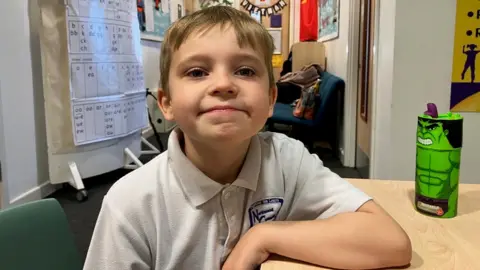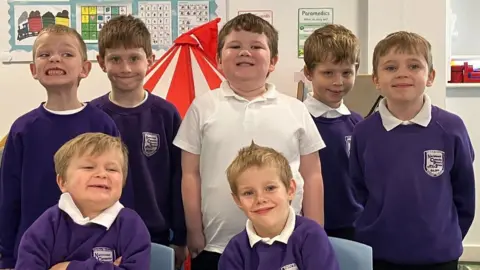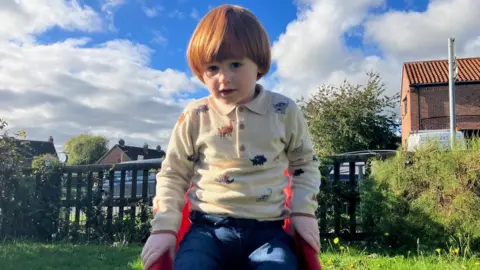Child speech delays increase following lockdowns
 BBC
BBCThe number of five and six year olds who need speech and language support at school has risen by 10% in England over the past year, BBC analysis shows.
The increase, which is substantially greater than previous years, is partly due to lockdown limiting social interactions, experts say.
The Royal College of Speech and Language Therapists says the profession is struggling to cope with the demand.
The government says it is investing £180m in early years development.
The BBC's Shared Data Unit's analysis found that the number of children in Year 1 who needed help with their language use increased more than most other areas of special educational needs.
A total of 42,341 children required extra support in 2021/22, up from 38,560 in 2020/21.
This is the year group who started reception after the first lockdown and had considerable disruption to their early years learning.
Previous rises in speech and language needs have been put down to larger student numbers and better detection in schools but the latest increase is much bigger.
Charity Speech and Language UK told the BBC that Covid restrictions affected some children's development by limiting socialising and new experiences, which helps them learn new words.
At Northwood Community Primary School in Knowsley, Merseyside, there is a higher number of children experiencing language issues than previous years. Out of 500 pupils, around 80 now require extra support.
When Lewis, who is seven, first arrived, his teachers noticed he was withdrawn, finding it hard to make friends, and struggling to express himself.
"You couldn't hold a full conversation with Lewis," his mum Christine Williams explains.
"He would point for a cup because he was too nervous to tell me what he wanted in case I didn't understand. It was a real struggle."
Christine said it was particularly hard during the pandemic when he was no longer seeing friends in person.
His headteacher, Sarah Murphy, believes the pandemic has affected children's natural communication and interaction skills, particularly for those who started school in September 2020 after the first lockdown.
She said the BBC's analysis reflected her own experience as a teacher. She has found students who had experienced disrupted early years learning - Pre-School to Reception - struggled once they reached Year 1 as they had missed opportunities for play-based learning.

Louisa Reeves is a speech and language therapist who has been working closely with the school. She says some of the children have less vocabulary, while others find it difficult to understand instructions, are struggling to take turns or negotiate over games.
Teachers have adapted their classroom teaching to include lots of intervention and small group work.
Lewis was given a place in the school's specialist speech hub which has 20 spaces for children across Knowsley with language difficulties.
The children attend small group sessions with trained staff and speech and language therapists and through play, music and talking exercises, develop the skills they need.
Christine says she can now hold a conversation with Lewis and his confidence has improved dramatically. She hopes he can return to his mainstream classroom soon.
"I could never, ever, repay the school for what they have done for Lewis," she says.

Tips for parents
- Make some time for playing and chatting with your child every day and follow their lead
- Make comments rather than asking your child lots of questions. Questions can feel like a test to children
- Share books with your child. This doesn't mean you have to read all the words - you can talk about the pictures
- Build a good relationship with your child's school. Discuss your concerns and see if they have noticed the same things and what can be done to help
- Look for information and ideas on the BBC's Tiny Happy People website or Speech and Language UK's website

Chief executive of the Royal College of Speech and Language Therapists, Kamini Gadhok, says the BBC's research confirms what she had been told anecdotally.
"It is a real worry. Our members have been telling us that they've been seeing a huge increase in the number of children referred to them," she says.
"We've hit a crisis point with services, where services are not able to meet the level of demand."
More than 100 charities and parent and carer organisations have written to the government to say long-term investment is needed to plug gaps in the specialist workforce supporting children in schools - including speech and language therapists.
Jane Harris, chief executive of Speech and Language UK, is calling for schools to be given free access to a screening tool to help them spot problems early.
She says children struggling with speech and language otherwise end up being incorrectly "labelled" with having mental health or behavioural problems.
There have been similar rises in Scotland, with children needing communication support increasing by 20% in the last two years. In Wales there was a slight decrease overall, but some councils have seen rises. Relevant data for Northern Ireland is not available, however the number of children with special educational needs is steadily rising.

There is also a huge backlog of children waiting for specialist help. Currently, 65,500 under the age of 18 are on the NHS waiting list to see a speech and language therapist, with an estimated 4,000 waiting for more than a year.
Three-year-old Sheamus from Scarborough has been on the list since last November.
"At first Sheamus was very frustrated," his mother Kat Allison says. "He didn't have anything at all to express himself. So he was quite angry, he'd get quite upset.
"We could see that all these words were bubbling up in him, but he just wasn't able to tell us them."
Kat decided to learn sign language through watching online videos and CBeebies' Mr Tumble. Since then, things have improved, but she does not know how to help him progress further without professional advice.
She says: "I think he's got a lot more to say for himself, but we don't know how to bring it out of him and he's going to really struggle when he starts school."
The Department for Education says the Nuffield Early Language Intervention programme, a 20-week course for children in Reception who need extra help with their language skills, will continue this year. It said it has already helped around 90,000 children.
It also said thousands of early years professionals will benefit from "a major investment to drive quality and training opportunities".

How has your child been affected by delays in speech and language therapy? You can share your experience by emailing [email protected].
Please include a contact number if you are willing to speak to a BBC journalist. You can also get in touch in the following ways:
- WhatsApp: +44 7756 165803
- Tweet: @BBC_HaveYourSay
- Upload your pictures/video here
- Or fill out the form below
- Please read our terms & conditions and privacy policy
If you are reading this page and can't see the form you will need to visit the mobile version of the BBC website to submit your question or comment or you can email us at [email protected]. Please include your name, age and location with any submission.

More about this story
The Shared Data Unit makes data journalism available to news organisations across the media industry, as part of a partnership between the BBC and the News Media Association.
